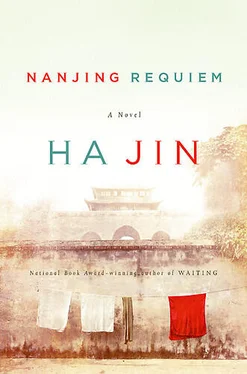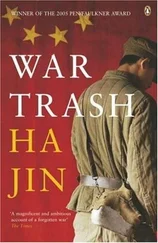“We don’t have any bandages,” the woman answered. “We’re here just to feed them and give them water.”
“So your job is to prolong their agony?”
“I wish I could do more, Principal Vautrin.” The young thing forced a smile, her face careworn and haggard.
“Minnie, it’s not her fault,” I said.
As I pulled her away, Minnie admitted, “You’re right. She’s not even a nurse and must be a volunteer like us.”
“At most she’s a nurse’s aide,” I replied.
“If only our students were still around. Then we could bring over two or three classes. Some of the well-heeled students would donate medicines and bandages for sure.”
“They would,” I said.
I debated whether I should wipe the man’s wound — to get rid of the maggots at least — but I was uncertain whether that would increase his pain. Without any medicine, it might make his wound more infected, so instead I found a newspaper and spread it over his stump.
We left the train station after ten p.m. All the way back, Minnie was withdrawn while Holly and I were talking about the collapse of the Chinese lines. Evidently Nanjing would fall in a matter of days. We were sure there would be more wounded men and refugees pouring into town.
As we approached our campus, Minnie said, “I must take a shower to get rid of the awful smell.”
“I guess you won’t stop thinking about those dying men for a while,” I said.
“Are you a worm inside me, Anling?” Minnie asked, using the Chinese expression. “How can you read my mind?”
Holly chortled, then said, “We may not be able to visit them again.”
Indeed, we would be too occupied in the forthcoming days to go to the train station again.
THE BORDERS of the Safety Zone had all been marked by Red Cross flags, though the Chinese army had been building batteries and defense works inside the southern part of the zone. John Rabe had to wrangle with Colonel Huang, an aide-de-camp to Generalissimo Chiang, to get the troops out of the neutral district. The young officer believed that the very sight of the Safety Zone would demoralize the soldiers who “must defend the city to the last drop of blood.” No matter how Rabe argued that from the military point of view it was absurd to set up defenses here, the colonel wouldn’t be persuaded — yet he took off with the general staff a few days later. Rabe joked afterward, “It’s so easy to resolve to fight with others’ blood.”
Before the generalissimo departed, he’d had another forty thousand yuan of the promised cash delivered to the Safety Zone Committee with a letter thanking the Westerners for their relief work. Some of the foreigners believed that the Chinese army was just putting up a show to save face, but Rabe didn’t think so. He was fearful that General Tang Sheng-chi, Chiang’s rival of a sort, who had only reluctantly assumed the role of the commander of the Nanjing defense, might sacrifice everything, including the lives of tens of thousands of civilians. Two days earlier the general had had dozens of boats burned to demonstrate that his troops would stand their ground, fighting with their backs to the river.
Rabe protested again to the officers in charge of the artillery units placed inside the Safety Zone and even threatened to resign his chairmanship and dissolve the Safety Zone Committee if the military personnel remained there, because that would give the Japanese a pretext to attack and eliminate the zone. General Tang assigned Colonel Long to work with Rabe, and together they managed to remove the troops. At the news of their withdrawal, we breathed a sigh of relief — our effort to set up refugee camps might not be wasted.
On Wednesday afternoon, December 8, Minnie held a neighborhood meeting, and more than a hundred people attended it, mostly women. Usually such a gathering in the chapel would draw a larger crowd because food was offered afterward, mainly bread and light pastries. Today the attendees were not interested in loaves and fishes; instead, they were eager to find out how soon they could come to Jinling at the time of crisis. For many of them, our college was the only sanctuary they could imagine. Miss Lou, an evangelical worker in the neighborhood, was present at the meeting. The previous day Minnie had allowed this middle-aged woman with intense eyes and a slightly sunken mouth to move into the Practice Hall and take charge of the refugees to be housed there. Miss Lou had no official affiliation with our college, but she was one of the few locals we could depend on. This little woman knew which people in the neighborhood were really destitute, so whenever we wanted to distribute charity, we’d go to her for assistance.
“Principal Vautrin, can I bring my dad with me when I come?” a slope-shouldered woman asked. “He’s bedridden and I can’t leave him behind.”
“Well, we will open our camp only to women and children,” Minnie answered.
A few men booed. One of them complained, “You can’t reject us like this, Principal Vautrin! This is unfair.”
I turned around to scowl at those men, some of whom were ne’er-do-wells, playing chess, cards, and mah-jongg day and night. Some had even snuck onto our campus to pilfer things.
Minnie waved for them to stop. As the hall quieted down, she resumed: “Ours is a women’s college, so it would be inappropriate for us to accommodate men.” She turned to a group of women. “Your menfolk can go to the other camps that take in families.”
“Why separate us?” a female voice asked.
“You won’t be separated for long,” Minnie said. “We’re talking about a matter of life or death while you’re still thinking about how to stay comfortably with your man.”
That cracked up the audience. We all knew that this woman had no children; she had been nicknamed the Barren One. She dropped her eyes, her cheeks crimson.
“Where are those camps that also accept men?” another female voice asked.
Minnie replied, “Wutaishan Primary School, the old Communications Ministry, Nanjing University’s Library, the military chemical shops — practically all the other camps admit families except for the one at the university’s dorms.”
“They’re too far away,” an old woman cried.
My temper was simmering. As I was wondering whether to say something to those selfish people, Miss Lou stood up and turned around to face them, her deep-set eyes steady behind her thick glasses. “Let’s remember who we are,” she said. “Jinling College is under no obligation whatsoever to accommodate any of us, but it offers to shelter us from the Eastern devils. We ought to appreciate what Principal Vautrin and her colleagues have been doing for us.”
“Shut up, little toady!” a male voice shouted from the back.
I stood and began to speak. “This is a chapel, not a cheap tavern where you can swear at will. So stop name-calling or make an exit. As for the men here, don’t you feel ashamed to compete with women and kids for safety? If you cannot fight the enemy and protect your families with arms, at least you should have the decency to leave them in more capable hands, while you look for refuge for yourselves elsewhere.”
That silenced the crowd, and for a moment the hall was so quiet that the distant artillery fire suddenly seemed to rumble louder and closer. After Miss Lou and I had sat down, Minnie continued, “We welcome all women and children, but we will do our best to shelter young women and girls first. That’s to say we encourage older women to stay home if they already live within the Safety Zone.”
“How about boys?” a woman asked from the back.
“Good question,” Minnie said. “Boys under thirteen will be admitted.”
“My fourteen-year-old is still a little kid,” a mother cried.
Читать дальше











